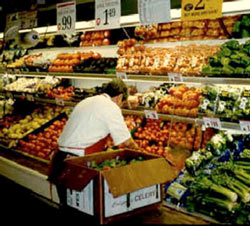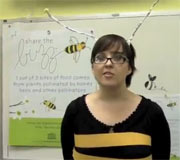We are the stewards of precious natural resources
Our daily efforts fulfill the mission to apply ecological principles to our business practices.
As integral team players, we have envisioned, organized, and driven the Green Mission at Whole Foods Markets stores. The sustainable business practices being applied are the fulfillment of an emergent economic system based on ecological principles.
Some resources take eons to replenish themselves, and are non-renewable in our lifetime. We also recognize the abundance of energy given to us by the sun: there is no energy shortage. We can, and we are, supplying our energy needs with current solar, wind, and biomass technologies.
The Earth is a system open to solar energy and closed to matter. Life here exists because photosynthesis occurs and the green cell gives us a source of economic value. The green cell is a sustainable resource.
Edutainment
.
 |
We've come a long way(Clerk culling into wax cardboard: image circa 2001) The grocery business provides a tremendous amount of food. This food comes from the green cell whether literally, as vegetables or grain, or as meat from animals that fed on the grain. In sustainable ecology there is no waste. What appears as waste is food for something else. This cyclic principle rules and is non-negotiable. All of the green "waste" in a supermarket can feed the cycle through composting. This compost becomes topsoil amendment and the cycle continues. |
Into the FutureWhat are some of the emerging trends for the WFM Green Mission? You tell us! Send us an email with your ideas, comments, or opinions! |
Facets of the Green Mission (2004)
Green Product Development (with infrastructure): each subsystem will need to think in terms of changing to a green analog product, whether it’s in the building, or in the warehouse, or foodservice, etc.
Sense of Urgency: the case for the Green Mission as a core business value -- largely because it is economical -- and the measurements (growth and profitability) are better in 7 to 10 years.
Green Energy: all the “electrons” can be from a green source (solar, wind, biomass), certified green and promoted as such.
Green Buildings: includes design, materials and other artifacts, energy efficiency.
Zero waste management:
Recycling
Reusing
Reducing
Composting: a specific recycling need in the supermarket industry, due to supply of compostables through our business.
Training, Education, Marketing: yearning to be green through learning. Greening the audience, medium, and message.
Green Mission Values
(From: www.wholefoods.com)"As a participant in the movement to a sustainable world, WFM is leading by example within the context that we know best: organic food and natural products, and sustainable and ethical business practices. "
Food
Green Energy
"We were the first major retailer to offset 100% of our energy use with wind energy credits. And we are glad to see that some of the world's largest retailers are following the example we've set in green building, the use of solar power, company-wide recycling programs, internal green mission programs and support for organics. When more companies take green steps, we all win."
Green Building
"Green building techniques conserve natural resources by reducing the use of virgin raw materials and minimizing the amount of toxic resins and volatile organic compounds (VOCs) off-gassed by traditional building materials such as laminates, paint and carpeting. Our store in Sarasota, Florida received LEED (Leadership in Energy and Environmental Design) Silver Certification by the U.S. Green Building Council, the first-ever environmentally-friendly supermarket designed in accordance with the LEED Green Building Rating System�. As of March 2010 we had about ten LEED rated stores, including two LEED Gold; we also had two Green Globes certified stores�our Dedham, MA store earned 3 globes (the equivalent to LEED Gold), thanks in part to a fuel cell and solar panels that generate on site nearly 100% of the store's power needs."
Other Initiatives
"In addition to the major efforts listed above, we are doing the following:
Compostable food packaging- We are in the process of replacing traditional plastic and paper prepared food containers and utensils with all-natural fiber packaging. Made from renewable resources such as sugar cane pulp and bamboo, they are compostable and, because they are unbleached, free from chlorine and dioxins.
Biodiesel- We are gradually converting our truck fleet to biodiesel fuels, reducing CO2 emissions into the atmosphere.
Water Conservation- �Some stores converted to flush-less urinals; each will save approximately 40,000 gallons of water per year (average use).
5% Day Donations- A significant number of our individual stores' 5% Days have an environmental mission: helping clean up air, rivers, oceans and landfills, to name a few.
Cleaning Supplies- Some stores are using Green Seal certified cleaning supplies and others are transitioning to the use of environmentally friendly cleaning and maintenance products.
Printing Standards- We carefully evaluate the need for everything we print, and when we do print, we insist on recycled paper, and we strive to use water-based inks and solvent-free printing processes where they are available."
Stay Tuned
We will be reporting on the developing innovations and creations of the green team!

